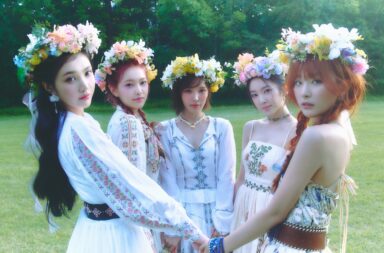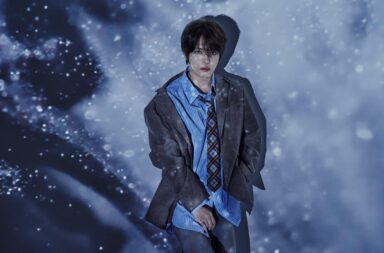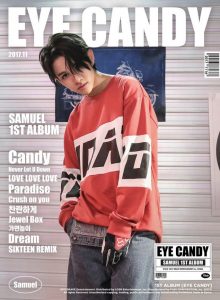 Samuel Kim has had a remarkable career, especially at his age: he was signed under Pledis Entertainment in 2012 and left in 2013 to sign on with Brave Entertainment. In April of 2017, Samuel participated as a contestant in Produce 101, but failed in making the final cut. His career has been through many changes, and as a 15 year old solo artist in an industry full of girl groups and boy groups, he’s shown incredible devotion to his career and craft.
Samuel Kim has had a remarkable career, especially at his age: he was signed under Pledis Entertainment in 2012 and left in 2013 to sign on with Brave Entertainment. In April of 2017, Samuel participated as a contestant in Produce 101, but failed in making the final cut. His career has been through many changes, and as a 15 year old solo artist in an industry full of girl groups and boy groups, he’s shown incredible devotion to his career and craft.
Eye Candy. The album has ten songs, including a remix of “Sixteen” from his debut mini-album, that all strike the tone of debut content with their youthful vibes. It’s interesting that this is the type of content that would have been expected from a debuting boy group, and yet it’s coming from a male solo artist.
For the most part, the songs are catchy and cute, with the exception of a few tracks. They all seem to be centered on the theme of young love and are mostly lighthearted. The mixing and producing is very clean and boyish, with a few different elements of other genres, like EDM, R&B, and trap.
“Candy” and “Never Let U Down” start off the album: both the songs are upbeat and positive, and really do a great job setting the tone for the album and for sort of identity that Samuel is trying to project. The beats are bubbly and fresh, and the constant repetition of the lyrics slowly melts into an addictive mantra. The mixing is smooth and tight. In particular, “Never Let U Down” has a great pop-R&B breakdown that fits seamlessly into the song. It doesn’t come across as out-of-place and it’s a quick break from the sugary sweetness from both the songs.
“LOVE LOVE LOVE” has a funky pop sound, interlaced with elements of more traditional R&B. It straddles the fine line between innocence and sensuality. Samuel’s playfulness is never lost, between the bouncing beat and the transitions between his funky bridge and his R&B bridges. It’s both well-balanced and takes risks that ultimately pay off. It’s a great track and keeps the momentum rolling from the last two songs, as well as start to provide a transition in the tone.
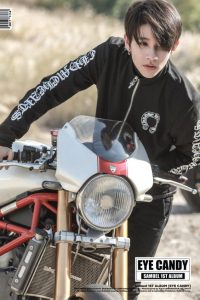
“Paradise” has a distinctively Western sort of sound to it, and it feels like Samuel’s singing is put much more to the forefront. The instrumentals are lighter and not so heavily emphasized, compared to “LOVE LOVE LOVE”. Samuel takes a more traditional pop approach to this song, but his vocals are so layered and they really get the chance to shine in “Paradise”.
“Crush On You” has a more R&B influence in it: the pace is slowed down, and the beats are heavier. Samuel’s lighter, higher voice provides a great contrast and breathes air into the track. The natural bounce of the synths and the tempo really capture a sense of youthful longing, just like a crush. Samuel’s brief rap breakdown displays his versatility well: he doesn’t try to be something he isn’t, like a hardcore rapper. His rapping interlaces well with his singing. Maybe the only negative to the song is that the slow tempo can make Samuel’s singing sound a little monotonous.
“Brightly” takes a strong trap and EDM influence, through the heavy snares and the building beat drops. His take on trap-style rapping isn’t over the top, and actually fits really well; it’s almost a little bit Taeyang-esque. It’s a considerable pick-up from “Crush On You”. Also, one of the best things about the track is just how well Samuel’s voice suits the mixing and producing of the song. The instrumentals and the tempo draw back for added effect, only putting more stress on the beat drops, and the beat drops become even more satisfying. It’s a great give and take.
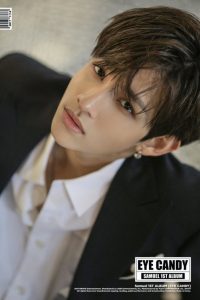
“Jewel Box”, on the other hand, feels uninteresting in comparison: it sounds pretty and Samuel’s voice is lovely. But it doesn’t quite pack the same punch the rest of the preceding songs have had. It just feels a little generic: it seems like cut and dry pop, and the echoing repetition of “box” sounds a little too repetitive. The mixing doesn’t take much in terms of risks. It’s a nice song overall, but it’s boring compared to “Candy”, “LOVE LOVE LOVE”, or “Brightly”.
“Mask Play”, featuring Maboos, feels like a bit of a call back to “Paradise”, with a somewhat Western-tropical sort of sound, but the mixing is a little more like “LOVE LOVE LOVE”. It’s playful and flirty, and Samuel’s voice is a great contrast against Maboos’ heavier, thicker voice. Maboos delivers a trap-styled rap and it melts next to Samuel’s softer singing, and the textural juxtaposition is compelling and keeps the song from getting monotonous.
“Dream” is incredibly varied with the mixing: a combination of smooth jazz, heavier R&B, with the use of trap snares and beats. The piano and saxophone embellish the mixing, providing a lightness between the weight on the beats. Even beyond that, the song in itself is just about how Samuel has been pushing himself to achieve his dream and how he wants to be someone’s hero, like all the cartoon heroes he saw as a child. Samuel isn’t just a pretty idol boy—he’s a musician trying to make his dreams come true, in spite of all his tribulations and failures. It may be the best song on the entire album, both in terms of the audio and the lyrical content.
The remix for “Sixteen” is just an acoustic version of “Sixteen”, and it’s nothing unexpected: “Sixteen” was already a bubbly and cheerful pop song, and the acoustic guitar just makes the track even more youthful in the sound alone.
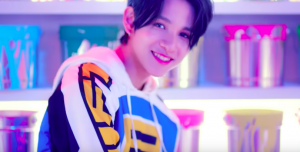 Samuel and Brave Entertainment have done a great job with the entire album: Eye Candy has a theme and idea that it sticks to, but the songs are all varied and incorporate many different styles and elements from other genres to keep them from getting repetitive. Samuel’s sense of playfulness and skill is present in each song, and that might be what really sets him apart as an artist: he’s playful, but he’s also got depth, despite his youth. Eye Candy is quality work, and I’m eagerly anticipating how Samuel will impress us next!
Samuel and Brave Entertainment have done a great job with the entire album: Eye Candy has a theme and idea that it sticks to, but the songs are all varied and incorporate many different styles and elements from other genres to keep them from getting repetitive. Samuel’s sense of playfulness and skill is present in each song, and that might be what really sets him apart as an artist: he’s playful, but he’s also got depth, despite his youth. Eye Candy is quality work, and I’m eagerly anticipating how Samuel will impress us next!
(YouTube. Images Via Brave Entertainment.)

